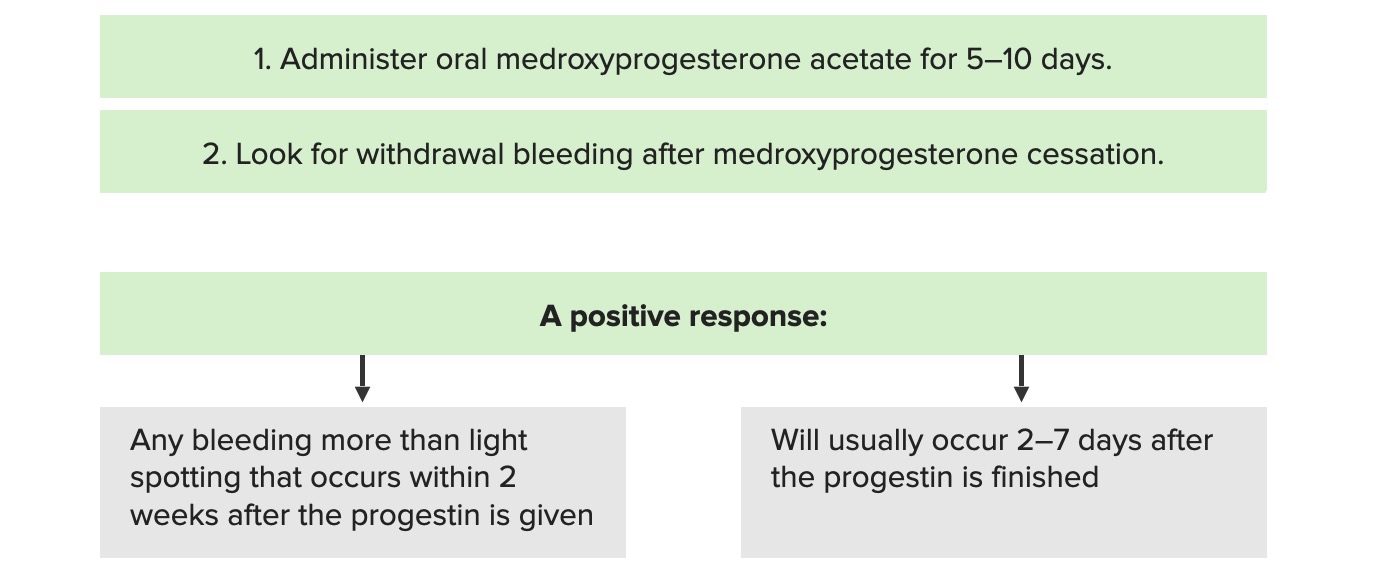Playlist
Show Playlist
Hide Playlist
Pituitary Case: 28-year-old Woman with Amenorrhea and Nipple Discharge
-
Slides 01-02-01 Adrenal Pituitary.pdf
-
Reference List Endocrinology.pdf
-
Reference List Pituitary and Hypothalamic Disorders.pdf
-
Download Lecture Overview
00:01 Let's go on to another case. 00:03 A 28-year old woman is evaluated for amenhorrhea. 00:06 She stopped taking her oral contraceptive pill eight months ago in order to get pregnant. 00:12 Her menstrual cycle has not resumed. 00:15 She did have normal menses prior to the beginning of oral contraceptives four years ago. 00:22 She also complains of daily nipple discharge over the last six weeks. 00:27 Other than the oral contraceptive pill, she takes no other medications. 00:31 On exam, her vital signs are normal, but she has a white discharge from bilateral nipples. 00:38 Her thyroid, skin, and visual field exam are normal. 00:42 Labs are significant for a prolactin level of 86 nanograms per ml, a normal thyroid-stimulating hormone, and a negative pregnancy test. 00:53 The MRI for pituitary shows a nine millimeter pituitary mass. 00:58 What is the diagnosis? This young woman has secondary amenhorrhea, the production of abnormal breast milk or galactorrhea, an elevated prolactin levels, and a pituitary mass. 01:12 She most likely has a prolactinoma in her anterior pituitary causing secondary amenhorrhea, which is the cessation of menses, despite the presence of normal cycles after puberty. 01:23 Pituitary microadenomas that secrete excessive prolactin cause secondary amenhorrhea due to the inhibition of gonadotropin-releasing hormone in the hypothalamus. 01:34 We would treat these patients with dopamine agonists. 01:37 Bromocriptine is a good first-line agent because of its low cost. 01:41 Cabergoline is better tolerated however because tumor shrinkage is better, but unfortunately, it is more expensive. 01:50 Always check response to therapy by repeating a prolactin level in one month after commencing treatment.
About the Lecture
The lecture Pituitary Case: 28-year-old Woman with Amenorrhea and Nipple Discharge by Michael Lazarus, MD is from the course Pituitary and Hypothalamic Disorders. It contains the following chapters:
- Pituitary Case: 28-year-old Woman with Amenhorrhea
- Prolactinoma
Included Quiz Questions
Which of the following signs and symptoms may be expected in a premenopausal woman with a prolactinoma? Select all that apply.
- Secondary amenorrhea
- Elevated gonadotropin-releasing hormone (GnRH)
- Galactorrhea
- Headache
- Infertility
Which of the following medications could be an initial treatment for pituitary adenomas? Select all that apply
- Bromocriptine
- Cabergoline
- Levothyroxine
- Metoclopramide
- Lactulose
Customer reviews
5,0 of 5 stars
| 5 Stars |
|
5 |
| 4 Stars |
|
0 |
| 3 Stars |
|
0 |
| 2 Stars |
|
0 |
| 1 Star |
|
0 |




